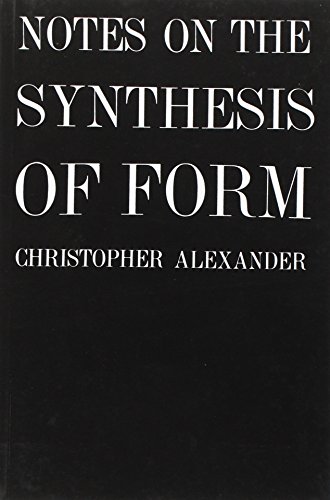notes synthesis form von alexander christopher (37 Ergebnisse)
FeedbackSuchfilter
Produktart
- Alle Product Types
- Bücher (37)
- Magazine & Zeitschriften (Keine weiteren Ergebnisse entsprechen dieser Verfeinerung)
- Comics (Keine weiteren Ergebnisse entsprechen dieser Verfeinerung)
- Noten (Keine weiteren Ergebnisse entsprechen dieser Verfeinerung)
- Kunst, Grafik & Poster (Keine weiteren Ergebnisse entsprechen dieser Verfeinerung)
- Fotografien (Keine weiteren Ergebnisse entsprechen dieser Verfeinerung)
- Karten (Keine weiteren Ergebnisse entsprechen dieser Verfeinerung)
- Manuskripte & Papierantiquitäten (Keine weiteren Ergebnisse entsprechen dieser Verfeinerung)
Zustand Mehr dazu
- Neu (21)
- Wie Neu, Sehr Gut oder Gut Bis Sehr Gut (3)
- Gut oder Befriedigend (11)
- Ausreichend oder Schlecht (2)
- Wie beschrieben (Keine weiteren Ergebnisse entsprechen dieser Verfeinerung)
Weitere Eigenschaften
- Erstausgabe (3)
- Signiert (Keine weiteren Ergebnisse entsprechen dieser Verfeinerung)
- Schutzumschlag (3)
- Angebotsfoto (18)
- Keine Print-on-Demand Angebote (37)
Sprache (2)
Gratisversand
Land des Verkäufers
Verkäuferbewertung
-
EUR 15,28
Währung umrechnenEUR 3,40 für den Versand innerhalb von/der USAAnzahl: 1 verfügbar
In den WarenkorbZustand: acceptable. Fairly worn, but readable and intact. If applicable: Dust jacket, disc or access code may not be included.
-
EUR 20,13
Währung umrechnenKostenlos für den Versand innerhalb von/der USAAnzahl: 1 verfügbar
In den WarenkorbZustand: Good. Used book that is in clean, average condition without any missing pages.
-
EUR 29,31
Währung umrechnenEUR 2,25 für den Versand innerhalb von/der USAAnzahl: 1 verfügbar
In den WarenkorbZustand: New.
-
Notes on the Synthesis of Form
Verlag: Harvard University Press, US, 1964
ISBN 10: 0674627512 ISBN 13: 9780674627512
Sprache: Englisch
Anbieter: Rarewaves.com USA, London, LONDO, Vereinigtes Königreich
EUR 34,00
Währung umrechnenKostenlos für den Versand von Vereinigtes Königreich nach USAAnzahl: Mehr als 20 verfügbar
In den WarenkorbPaperback. Zustand: New. "These notes are about the process of design: the process of inventing things which display new physical order, organization, form, in response to function." This book, opening with these words, presents an entirely new theory of the process of design.In the first part of the book, Christopher Alexander discusses the process by which a form is adapted to the context of human needs and demands that has called it into being. He shows that such an adaptive process will be successful only if it proceeds piecemeal instead of all at once. It is for this reason that forms from traditional un-self-conscious cultures, molded not by designers but by the slow pattern of changes within tradition, are so beautifully organized and adapted. When the designer, in our own self-conscious culture, is called on to create a form that is adapted to its context he is unsuccessful, because the preconceived categories out of which he builds his picture of the problem do not correspond to the inherent components of the problem, and therefore lead only to the arbitrariness, willfulness, and lack of understanding which plague the design of modern buildings and modern cities.In the second part, Mr. Alexander presents a method by which the designer may bring his full creative imagination into play, and yet avoid the traps of irrelevant preconception. He shows that, whenever a problem is stated, it is possible to ignore existing concepts and to create new concepts, out of the structure of the problem itself, which do correspond correctly to what he calls the subsystems of the adaptive process. By treating each of these subsystems as a separate subproblem, the designer can translate the new concepts into form. The form, because of the process, will be well-adapted to its context, non-arbitrary, and correct.The mathematics underlying this method, based mainly on set theory, is fully developed in a long appendix. Another appendix demonstrates the application of the method to the design of an Indian village.
-
EUR 31,94
Währung umrechnenEUR 2,25 für den Versand innerhalb von/der USAAnzahl: 1 verfügbar
In den WarenkorbZustand: As New. Unread book in perfect condition.
-
EUR 29,55
Währung umrechnenEUR 4,77 für den Versand von Vereinigtes Königreich nach USAAnzahl: 15 verfügbar
In den WarenkorbPAP. Zustand: New. New Book. Shipped from UK. Established seller since 2000.
-
Notes on the Synthesis of Form (Revised)
Verlag: Harvard University Press January 1964, 1964
ISBN 10: 0674627512 ISBN 13: 9780674627512
Sprache: Englisch
Anbieter: Eighth Day Books, LLC, Wichita, KS, USA
EUR 29,81
Währung umrechnenEUR 5,07 für den Versand innerhalb von/der USAAnzahl: 3 verfügbar
In den WarenkorbPaper Back. Zustand: New.
-
Notes on The Synthesis of Form
Verlag: Harvard University Press, Printed in USA, 1964
ISBN 10: 0674627512 ISBN 13: 9780674627512
Sprache: Englisch
Anbieter: Acadia Art & Rare Books. Est. 1931, Toronto, ON, Kanada
EUR 31,80
Währung umrechnenEUR 5,11 für den Versand von Kanada nach USAAnzahl: 1 verfügbar
In den WarenkorbZustand: Near Fine. Softcover. 8vo. 216pp. Illustrations in b/w. Slight wear to covers. Clean and unmarked interior.
-
Notes on the Synthesis of Form (Paperback)
Verlag: Harvard University Press, Cambridge, Mass, 1964
ISBN 10: 0674627512 ISBN 13: 9780674627512
Sprache: Englisch
Anbieter: Grand Eagle Retail, Mason, OH, USA
EUR 38,72
Währung umrechnenKostenlos für den Versand innerhalb von/der USAAnzahl: 1 verfügbar
In den WarenkorbPaperback. Zustand: new. Paperback. "These notes are about the process of design: the process of inventing things which display new physical order, organization, form, in response to function." This book, opening with these words, presents an entirely new theory of the process of design.In the first part of the book, Christopher Alexander discusses the process by which a form is adapted to the context of human needs and demands that has called it into being. He shows that such an adaptive process will be successful only if it proceeds piecemeal instead of all at once. It is for this reason that forms from traditional un-self-conscious cultures, molded not by designers but by the slow pattern of changes within tradition, are so beautifully organized and adapted. When the designer, in our own self-conscious culture, is called on to create a form that is adapted to its context he is unsuccessful, because the preconceived categories out of which he builds his picture of the problem do not correspond to the inherent components of the problem, and therefore lead only to the arbitrariness, willfulness, and lack of understanding which plague the design of modern buildings and modern cities.In the second part, Mr. Alexander presents a method by which the designer may bring his full creative imagination into play, and yet avoid the traps of irrelevant preconception. He shows that, whenever a problem is stated, it is possible to ignore existing concepts and to create new concepts, out of the structure of the problem itself, which do correspond correctly to what he calls the subsystems of the adaptive process. By treating each of these subsystems as a separate subproblem, the designer can translate the new concepts into form. The form, because of the process, will be well-adapted to its context, non-arbitrary, and correct.The mathematics underlying this method, based mainly on set theory, is fully developed in a long appendix. Another appendix demonstrates the application of the method to the design of an Indian village. "These notes are about the process of design: the process of inventing things which display new physical order, organization, form, in response to function." This book, opening with these words, presents an entirely new theory on the process of design. Shipping may be from multiple locations in the US or from the UK, depending on stock availability.
-
EUR 35,05
Währung umrechnenEUR 5,50 für den Versand von Italien nach USAAnzahl: Mehr als 20 verfügbar
In den WarenkorbZustand: new.
-
EUR 35,24
Währung umrechnenEUR 7,45 für den Versand von Vereinigtes Königreich nach USAAnzahl: 3 verfügbar
In den WarenkorbZustand: New. pp. 224.
-
Notes on the Synthesis of Form
Verlag: Harvard University Press, US, 1964
ISBN 10: 0674627512 ISBN 13: 9780674627512
Sprache: Englisch
Anbieter: Rarewaves USA, OSWEGO, IL, USA
EUR 43,04
Währung umrechnenKostenlos für den Versand innerhalb von/der USAAnzahl: 2 verfügbar
In den WarenkorbPaperback. Zustand: New. "These notes are about the process of design: the process of inventing things which display new physical order, organization, form, in response to function." This book, opening with these words, presents an entirely new theory of the process of design.In the first part of the book, Christopher Alexander discusses the process by which a form is adapted to the context of human needs and demands that has called it into being. He shows that such an adaptive process will be successful only if it proceeds piecemeal instead of all at once. It is for this reason that forms from traditional un-self-conscious cultures, molded not by designers but by the slow pattern of changes within tradition, are so beautifully organized and adapted. When the designer, in our own self-conscious culture, is called on to create a form that is adapted to its context he is unsuccessful, because the preconceived categories out of which he builds his picture of the problem do not correspond to the inherent components of the problem, and therefore lead only to the arbitrariness, willfulness, and lack of understanding which plague the design of modern buildings and modern cities.In the second part, Mr. Alexander presents a method by which the designer may bring his full creative imagination into play, and yet avoid the traps of irrelevant preconception. He shows that, whenever a problem is stated, it is possible to ignore existing concepts and to create new concepts, out of the structure of the problem itself, which do correspond correctly to what he calls the subsystems of the adaptive process. By treating each of these subsystems as a separate subproblem, the designer can translate the new concepts into form. The form, because of the process, will be well-adapted to its context, non-arbitrary, and correct.The mathematics underlying this method, based mainly on set theory, is fully developed in a long appendix. Another appendix demonstrates the application of the method to the design of an Indian village.
-
EUR 41,39
Währung umrechnenEUR 3,40 für den Versand innerhalb von/der USAAnzahl: 3 verfügbar
In den WarenkorbZustand: New. pp. 224.
-
EUR 45,60
Währung umrechnenKostenlos für den Versand innerhalb von/der USAAnzahl: 1 verfügbar
In den WarenkorbHardcover. Zustand: Good. No Jacket. Ninth printing. Shelf and handling wear to cover and binding, with general signs of previous use. No notes, inscriptions or underlining to text. Secure packaging for safe delivery. 1.55.
-
EUR 33,94
Währung umrechnenEUR 11,52 für den Versand von Vereinigtes Königreich nach USAAnzahl: Mehr als 20 verfügbar
In den WarenkorbPaperback / softback. Zustand: New. New copy - Usually dispatched within 4 working days. 330.
-
Notes on the Synthesis of Form (Harvard Paperbacks)
Anbieter: Ria Christie Collections, Uxbridge, Vereinigtes Königreich
EUR 33,52
Währung umrechnenEUR 13,73 für den Versand von Vereinigtes Königreich nach USAAnzahl: Mehr als 20 verfügbar
In den WarenkorbZustand: New. In.
-
EUR 29,54
Währung umrechnenEUR 17,20 für den Versand von Vereinigtes Königreich nach USAAnzahl: 1 verfügbar
In den WarenkorbZustand: New.
-
EUR 35,02
Währung umrechnenEUR 17,20 für den Versand von Vereinigtes Königreich nach USAAnzahl: 1 verfügbar
In den WarenkorbZustand: As New. Unread book in perfect condition.
-
EUR 41,99
Währung umrechnenEUR 9,95 für den Versand von Deutschland nach USAAnzahl: 3 verfügbar
In den WarenkorbZustand: New. pp. 224.
-
EUR 5,68
Währung umrechnenEUR 17,88 für den Versand von Kanada nach USAAnzahl: 1 verfügbar
In den WarenkorbZustand: Very Good.
-
Notes on the Synthesis of Form (Harvard Paperbacks)
Anbieter: Revaluation Books, Exeter, Vereinigtes Königreich
EUR 35,70
Währung umrechnenEUR 28,66 für den Versand von Vereinigtes Königreich nach USAAnzahl: 2 verfügbar
In den WarenkorbPaperback. Zustand: Brand New. later pr. edition. 224 pages. 8.25x5.50x0.75 inches. In Stock.
-
Notes on the Synthesis of Form (Paperback)
Verlag: Harvard University Press, Cambridge, Mass, 1964
ISBN 10: 0674627512 ISBN 13: 9780674627512
Sprache: Englisch
Anbieter: CitiRetail, Stevenage, Vereinigtes Königreich
EUR 35,41
Währung umrechnenEUR 42,42 für den Versand von Vereinigtes Königreich nach USAAnzahl: 1 verfügbar
In den WarenkorbPaperback. Zustand: new. Paperback. "These notes are about the process of design: the process of inventing things which display new physical order, organization, form, in response to function." This book, opening with these words, presents an entirely new theory of the process of design.In the first part of the book, Christopher Alexander discusses the process by which a form is adapted to the context of human needs and demands that has called it into being. He shows that such an adaptive process will be successful only if it proceeds piecemeal instead of all at once. It is for this reason that forms from traditional un-self-conscious cultures, molded not by designers but by the slow pattern of changes within tradition, are so beautifully organized and adapted. When the designer, in our own self-conscious culture, is called on to create a form that is adapted to its context he is unsuccessful, because the preconceived categories out of which he builds his picture of the problem do not correspond to the inherent components of the problem, and therefore lead only to the arbitrariness, willfulness, and lack of understanding which plague the design of modern buildings and modern cities.In the second part, Mr. Alexander presents a method by which the designer may bring his full creative imagination into play, and yet avoid the traps of irrelevant preconception. He shows that, whenever a problem is stated, it is possible to ignore existing concepts and to create new concepts, out of the structure of the problem itself, which do correspond correctly to what he calls the subsystems of the adaptive process. By treating each of these subsystems as a separate subproblem, the designer can translate the new concepts into form. The form, because of the process, will be well-adapted to its context, non-arbitrary, and correct.The mathematics underlying this method, based mainly on set theory, is fully developed in a long appendix. Another appendix demonstrates the application of the method to the design of an Indian village. "These notes are about the process of design: the process of inventing things which display new physical order, organization, form, in response to function." This book, opening with these words, presents an entirely new theory on the process of design. Shipping may be from our UK warehouse or from our Australian or US warehouses, depending on stock availability.
-
EUR 74,87
Währung umrechnenEUR 5,92 für den Versand innerhalb von/der USAAnzahl: 1 verfügbar
In den Warenkorbpaperback. Zustand: New. In shrink wrap. Looks like an interesting title!
-
EUR 82,46
Währung umrechnenKostenlos für den Versand innerhalb von/der USAAnzahl: 1 verfügbar
In den WarenkorbZustand: good. A copy that has been read, remains in good condition. All pages are intact, and the cover is intact. The spine and cover show signs of wear. Pages can include notes and highlighting and show signs of wear, and the copy can include "From the library of" labels or previous owner inscriptions. 100% GUARANTEE! Shipped with delivery confirmation, if youâre not satisfied with purchase please return item for full refund. Ships via media mail.
-
EUR 82,57
Währung umrechnenKostenlos für den Versand innerhalb von/der USAAnzahl: 1 verfügbar
In den WarenkorbHardcover. Zustand: Good. No Jacket. Pages can have notes/highlighting. Spine may show signs of wear. ~ ThriftBooks: Read More, Spend Less 1.55.
-
Notes on the Synthesis of Form
Verlag: Harvard University Press, US, 1964
ISBN 10: 0674627512 ISBN 13: 9780674627512
Sprache: Englisch
Anbieter: Rarewaves USA United, OSWEGO, IL, USA
EUR 44,63
Währung umrechnenEUR 42,57 für den Versand innerhalb von/der USAAnzahl: 2 verfügbar
In den WarenkorbPaperback. Zustand: New. "These notes are about the process of design: the process of inventing things which display new physical order, organization, form, in response to function." This book, opening with these words, presents an entirely new theory of the process of design.In the first part of the book, Christopher Alexander discusses the process by which a form is adapted to the context of human needs and demands that has called it into being. He shows that such an adaptive process will be successful only if it proceeds piecemeal instead of all at once. It is for this reason that forms from traditional un-self-conscious cultures, molded not by designers but by the slow pattern of changes within tradition, are so beautifully organized and adapted. When the designer, in our own self-conscious culture, is called on to create a form that is adapted to its context he is unsuccessful, because the preconceived categories out of which he builds his picture of the problem do not correspond to the inherent components of the problem, and therefore lead only to the arbitrariness, willfulness, and lack of understanding which plague the design of modern buildings and modern cities.In the second part, Mr. Alexander presents a method by which the designer may bring his full creative imagination into play, and yet avoid the traps of irrelevant preconception. He shows that, whenever a problem is stated, it is possible to ignore existing concepts and to create new concepts, out of the structure of the problem itself, which do correspond correctly to what he calls the subsystems of the adaptive process. By treating each of these subsystems as a separate subproblem, the designer can translate the new concepts into form. The form, because of the process, will be well-adapted to its context, non-arbitrary, and correct.The mathematics underlying this method, based mainly on set theory, is fully developed in a long appendix. Another appendix demonstrates the application of the method to the design of an Indian village.
-
Notes on the Synthesis of Form (Paperback)
Verlag: Harvard University Press, Cambridge, Mass, 1964
ISBN 10: 0674627512 ISBN 13: 9780674627512
Sprache: Englisch
Anbieter: AussieBookSeller, Truganina, VIC, Australien
EUR 59,17
Währung umrechnenEUR 31,50 für den Versand von Australien nach USAAnzahl: 1 verfügbar
In den WarenkorbPaperback. Zustand: new. Paperback. "These notes are about the process of design: the process of inventing things which display new physical order, organization, form, in response to function." This book, opening with these words, presents an entirely new theory of the process of design.In the first part of the book, Christopher Alexander discusses the process by which a form is adapted to the context of human needs and demands that has called it into being. He shows that such an adaptive process will be successful only if it proceeds piecemeal instead of all at once. It is for this reason that forms from traditional un-self-conscious cultures, molded not by designers but by the slow pattern of changes within tradition, are so beautifully organized and adapted. When the designer, in our own self-conscious culture, is called on to create a form that is adapted to its context he is unsuccessful, because the preconceived categories out of which he builds his picture of the problem do not correspond to the inherent components of the problem, and therefore lead only to the arbitrariness, willfulness, and lack of understanding which plague the design of modern buildings and modern cities.In the second part, Mr. Alexander presents a method by which the designer may bring his full creative imagination into play, and yet avoid the traps of irrelevant preconception. He shows that, whenever a problem is stated, it is possible to ignore existing concepts and to create new concepts, out of the structure of the problem itself, which do correspond correctly to what he calls the subsystems of the adaptive process. By treating each of these subsystems as a separate subproblem, the designer can translate the new concepts into form. The form, because of the process, will be well-adapted to its context, non-arbitrary, and correct.The mathematics underlying this method, based mainly on set theory, is fully developed in a long appendix. Another appendix demonstrates the application of the method to the design of an Indian village. "These notes are about the process of design: the process of inventing things which display new physical order, organization, form, in response to function." This book, opening with these words, presents an entirely new theory on the process of design. Shipping may be from our Sydney, NSW warehouse or from our UK or US warehouse, depending on stock availability.
-
Notes on the Synthesis of Form
Verlag: Harvard University Press Jan 1964, 1964
ISBN 10: 0674627512 ISBN 13: 9780674627512
Sprache: Englisch
Anbieter: AHA-BUCH GmbH, Einbeck, Deutschland
EUR 29,63
Währung umrechnenEUR 61,25 für den Versand von Deutschland nach USAAnzahl: 2 verfügbar
In den WarenkorbTaschenbuch. Zustand: Neu. Neuware - 'These notes are about the process of design: the process of inventing things which display new physical order, organization, form, in response to function.' This book, opening with these words, presents an entirely new theory of the process of design.
-
Notes on the Synthesis of Form
Verlag: Harvard University Press, US, 1964
ISBN 10: 0674627512 ISBN 13: 9780674627512
Sprache: Englisch
Anbieter: Rarewaves.com UK, London, Vereinigtes Königreich
EUR 30,65
Währung umrechnenEUR 74,51 für den Versand von Vereinigtes Königreich nach USAAnzahl: Mehr als 20 verfügbar
In den WarenkorbPaperback. Zustand: New. "These notes are about the process of design: the process of inventing things which display new physical order, organization, form, in response to function." This book, opening with these words, presents an entirely new theory of the process of design.In the first part of the book, Christopher Alexander discusses the process by which a form is adapted to the context of human needs and demands that has called it into being. He shows that such an adaptive process will be successful only if it proceeds piecemeal instead of all at once. It is for this reason that forms from traditional un-self-conscious cultures, molded not by designers but by the slow pattern of changes within tradition, are so beautifully organized and adapted. When the designer, in our own self-conscious culture, is called on to create a form that is adapted to its context he is unsuccessful, because the preconceived categories out of which he builds his picture of the problem do not correspond to the inherent components of the problem, and therefore lead only to the arbitrariness, willfulness, and lack of understanding which plague the design of modern buildings and modern cities.In the second part, Mr. Alexander presents a method by which the designer may bring his full creative imagination into play, and yet avoid the traps of irrelevant preconception. He shows that, whenever a problem is stated, it is possible to ignore existing concepts and to create new concepts, out of the structure of the problem itself, which do correspond correctly to what he calls the subsystems of the adaptive process. By treating each of these subsystems as a separate subproblem, the designer can translate the new concepts into form. The form, because of the process, will be well-adapted to its context, non-arbitrary, and correct.The mathematics underlying this method, based mainly on set theory, is fully developed in a long appendix. Another appendix demonstrates the application of the method to the design of an Indian village.
-
EUR 140,31
Währung umrechnenEUR 6,81 für den Versand innerhalb von/der USAAnzahl: 1 verfügbar
In den WarenkorbHardcover. Zustand: Good. Zustand des Schutzumschlags: Very Good. fourth printing 1967. slight edgewear to dj.




















